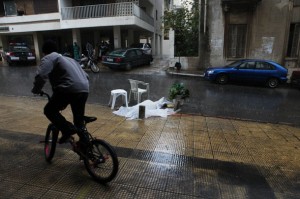Below is an interview with Matthew Cassel, an American photographer and journalist based in Lebanon about his photography project Unseen Lives: Migrant Domestic Workers in Lebanon (see slideshow at the bottom of this post). In the interview Matthew describes how he was able to get close to the migrant domestic workers community in Lebanon and witness their commitment to each other as they navigate the abusive system that deprives them of basic human rights and ties them to their employer.
Could you please introduce yourself to our readers?
My name is Matthew Cassel, I am a photographer and journalist from Chicago currently living in Beirut.
What prompted you to begin this project of photographing migrant domestic workers in Lebanon?
I began working on this issue after Theresa Seda, a 28-year-old domestic worker and mother of three from the Philippines, fell to her death from the seventh floor balcony of her employer's home across the street from my home in Beirut.
Soon after I was approached by KAFA (Enough) Violence and Exploitation, a Lebanese NGO that is doing research and advocacy work on the issue of violence against women in Lebanon, which includes migrant domestic workers. We wanted to put together a photo project that showed the lives and culture of these women to accompany KAFA's important research.
The title of your work is "Unseen Lives". Why do you think Lebanese society is generally unaware of the lives of expatriate domestic workers?
It's not only Lebanese society that is unaware of the lives of workers, whether they be foreigners or locals. Around the world, especially in my native country the US, workers often go unnoticed and unappreciated for their importance in society. Do most shoppers go to the grocery store and think about who makes the various products or who harvests and delivers fruits and vegetables? And even when we see workers every day like those working construction or collecting garbage, how often do most stop and think about that worker's story? I would say "unseen lives" is a universal term to describe workers around the world who are rarely given a voice by most mainstream media and popular culture.
However, the situation is a bit different in a country like Lebanon where more and more migrants are coming in search of work and are increasingly being denied even the most basic rights. The situation is more dire here than other places, especially considering the increasing number of domestic workers who have died in recent years, and I think it's an issue that should spark outrage and force people to act immediately.
Some of the photographs from the essay were shot inside the homes the maids worked in and documented their daily routine. What are you observations about their working and living conditions? Do you think those conditions may differ in other homes?
Conditions differ from home to home. But in my opinion, hiring a woman to live and work inside your home leaving her with no separation between her personal and work life is enough to be considered exploitation and mistreatment. In every home where women both work and live, they are "at work" 24/7 (there is even a new activist group called 24/7 that organizes to support domestic workers). They can be woken up in the middle of the night to take care of a sick child or leaky faucet. Never, except for those who are actually allowed a day off, are they "off the clock" and away from their work. And usually a day off means a few hour break on Sunday or other day when most women have to spend that time constantly checking the clock so they don't violate their curfew and upset their employers. Since workers have little to no protection, the few rights they might have are entirely at the whim of the employer and can be taken away at any second. The employer can give them additional work, not allow them a day off, and take advantage of them in other ways. Therefore, many workers who I met share a sense of not wanting to upset their employer, or, "keep madame happy" as I heard some women say.
In the few homes where I photographed, women were treated well and were happy with their jobs. As I say in the project's statement, this body of photographs in no way accurately portrays the lives of most domestic workers in this country. Those who I could photograph had a "better" situation than most in the sense that they were able to leave their employers' homes or their employers were comfortable asking their domestic workers if I could photograph them in the work place. Obviously, an employer who mistreats or abuses their worker wouldn't want to allow an American photographer in to expose that situation. But I know that such situations do exist and that they are not rare. Many women who have been here for a few years or more have had more than one employer, and they described to me how either they or other workers who they know have faced or are currently facing abuse and mistreatment from their employers. It's frightening to hear these stories knowing that there is very little that can be done in most cases.
Theresa Seda was an example of this. In the two months that she worked in Lebanon, she was never able to leave the home unless it was to take care of her employer's kids when the family went out. She was essentially a prisoner in her employer's home although she committed no crime. And unfortunately, many women face a similar situation.
So, while the conditions may differ slightly from home to home, in general the system of hiring foreign women as domestic workers is broken and needs to be fixed.
Were you able to communicate with some of the maids? What did they tell you about working conditions? What are their perceptions of Lebanese society?
I was able to communicate with many different women from every country that domestic workers in Lebanon come from. And I found that very few women, a definite minority, had positive views of Lebanese society. The overwhelming majority who I spoke with -- and mind you these are the workers who have better situations -- have become used to living and working in this society and are very critical of the way they're treated by Lebanese civilians and authorities. Unless a woman has or had an especially good relationship with her employers, it's rare that she would recall stories of when she felt she had a Lebanese friend or someone she felt she could trust. This helps explain the tightly knit societies that exist between migrant workers. When they can, women reach out to their other countrywomen who they can speak their native language with, and they'll even reach out to workers from other countries who they might have trouble communicating with just to form a network and strengthen the worker community. Almost all who I've met seem to have the attitude that no Lebanese are going to protect them, so they have to protect themselves.
Was there one scene in particular that made an impression on you during the months of photographing migrant domestic workers?

Obviously, Theresa's death across the street from my home affected me most. It's difficult to put into words
the feelings I had as I watched her body lie in the street and under the rain covered only by a white tarp held down by a broken plastic chair, a flower pot, and bits of cement. On the street around her body, people walked by and cars passed, it seemed to be business as usual and was very surreal to witness. But it showed me how little rights these foreign women in Lebanon have, even in death. After that moment I had no choice other than to speak out and take action.
The other scenes that affected me most were the ones that I couldn't photograph. One worker in particular who is a very active member in the worker community and who has also become a very close friend of mine, told me horrific stories every day about new cases of abuses that she discovered through her networks. There is one woman in particular who comes from the same country as she does and who managed to get in touch with my friend and tell her that she needed help. The woman had only one minute to explain on a pay phone as she walked her employer's dog near their home.
My friend was able to quickly jot down some details about the home and the surrounding area before she told the other worker to write her testimony detailing her situation and the abuse she faced on a piece of paper that she could come pick up from her later. I went with my friend after her job one day, and we spent hours following the clues until we found the house where the woman worked. As we stood across the street looking at the house it was awful to realize that inside a woman was being abused and there was absolutely nothing we could do about it. We had to leave so that my friend could come back and wait around the corner for the next time the worker left with the dog so she can pick up the note from her.
For my friend, this was something she does on a regular basis. She calls it "note-dropping," sometimes she picks up notes from trash cans, from under balconies, from the grocery store. The notes are just the first step before she takes them to one of the NGOs to see if a lawyer can get involved and help the abused worker. And even when a lawyer does get involved, it's far from guaranteed that the abused worker can be rescued from her employer.
Seeing the commitment that my friend and so many other workers in Lebanon have to their community left the biggest impression on me. It's really been an honor for me to get to know people who have no money, no rights, no free time, yet still somehow manage to organize themselves and struggle for justice.
What would you like our readers to know about migrant domestic workers in Lebanon?
I wish that everyone would get to know these women and listen to them talk about their lives, their families, their homes and everything else that they've had to leave behind in search of work. Their struggle is incredible and it's far from over, they deserve our respect and support.
Unseen Lives: Migrant Domestic Workers in Lebanon - Images by Matthew Cassel




